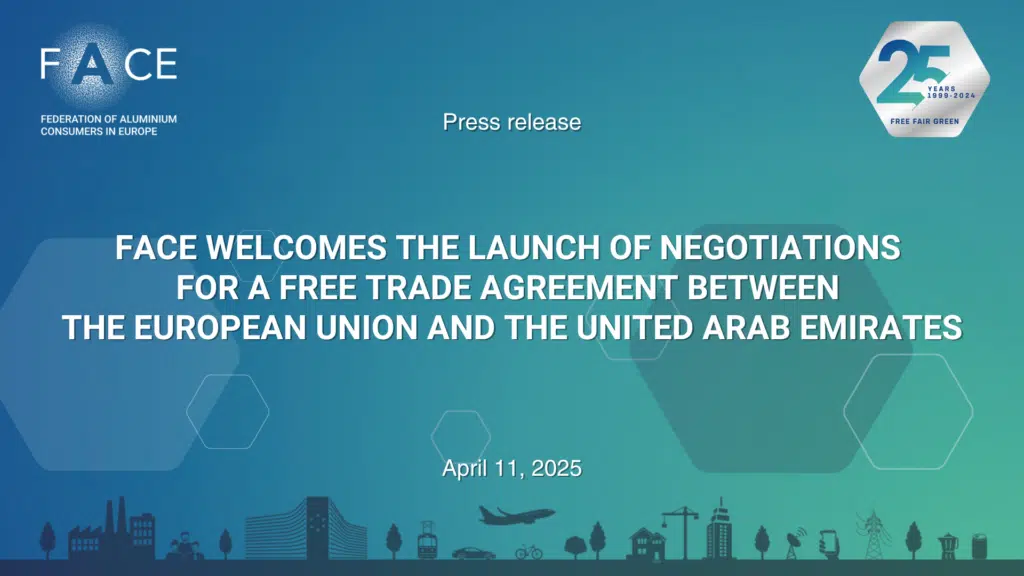PRESS RELEASE – for immediate release
Federation of Aluminium Consumers in Europe – FACE
Friday 11 April 2025, Brussels
PRESS RELEASE
FACE WELCOMES THE LAUNCH OF NEGOTIATIONS FOR A FREE TRADE AGREEMENT BETWEEN THE EUROPEAN UNION AND THE UNITED ARAB EMIRATES
After a cordial phone call with His Highness Sheikh Mohamed bin Zayed Al Nahyan, President of the United Arab Emirates, Ursula Von der Leyen, President of the European Commission, announced the launch of bilateral trade negotiations between the EU and the Gulf country.
FACE welcomes this positive new step that has to be considered in the wider context of a strategic partnership between the European Union and the Gulf Cooperation Council (GCC).
In a fragmented world every bilateral and plurilateral cooperation can act as a building block to help restore a functional global system and to advance sustainable prosperity.
“Our association was a pioneer”, says Roger Bertozzi, president of FACE, “as soon as its creation in 1999, FACE called for an EU-GCC Strategic Partnership, a call that we renewed in 2010 during a consultation of the European Parliament on EU-GCC relations”.
“From its creation, FACE invited DUBAL, the primary aluminium producer of Dubai, to be an associate member. Later, DUBAL became EGA, Emirates Global Aluminium, the world’s leading premium aluminium producer. Today, we are proud to continue this decades long relationship and friendship through the membership in FACE of the GAC, the Gulf Aluminium Council, which represents the GCC aluminium industry upstream and downstream”, Bertozzi adds.
FACE therefore applauded when in May 2022 the EU offered to its GCC partners to consider the establishment of a strategic partnership whose key pillars could be “a prosperity agenda, research and innovation, the green transition and sustainable energy security, regional stability and global security, a global humanitarian and development partnership, a partnership for people including education and cultural cooperation and a stronger institutional partnership which would significantly raise the level of political engagement and coordination”.
The President of FACE, Roger Bertozzi, further stresses that “when it comes to trade and investment negotiations, we see three possible tracks that can work in a mutually supportive way: a block to block track to revive the stalled EU-GCC free trade agreement (FTA) talks, a sectoral track allowing for EU-GCC agreements in specific areas of mutual interest, such as critical raw materials; and bilateral negotiations such as the EU-UAE FTA framework that has been just announced and that has both its own merits and the virtue to encourage other GCC countries to open bilateral negotiations with the European Union”.
For the aluminium industry, a number of promising perspectives of cooperation and investments present themselves between the EU and the UAE, beyond trade: finance, technology and R&D in the metallurgical sector; digitalisation and automation; AI in industrial processes, logistics and customer relations; solar and nuclear energy for aluminium smelting; hydrogen, innovative applications for aluminium, recycling technologies and operations.
A deeper and broader EU-UAE and EU-GCC partnership could also foster joint investments outside the two blocks, for example in Africa and in the Maghreb and Mashrek or Central Asia and India; as inter-regional cooperations can bring enormous benefits, generate prosperity, promote stability and contribute to climate change mitigation and adaptation thanks to decarbonisation and environmental regeneration efforts and joint ventures in green goods and in breakthrough technologies.
The world today is a chessboard for great power strategy. Regional powers have a strategic interest to diversify and intensify their network of agreements: in a multipolar world where multilateralism is suspended, bilateral and plurilateral engagement are vital to protect strategic autonomy, to support a functional international system and to foster clean industrial growth.
The United Arab Emirates are creativity-driven and future-oriented. Their long-term prosperity depends on a sustainable development and on regional and international stability and security, in particular around the Mediterranean; an interest shared with the EU as they are in the neighbourhood of the Maghreb and Mashrek regions.
Combining their talents, resources, creativity and influence in the world stage can add much to the wealth, well-being and security of the UAE and of the EU.
“A vibrant EU-UAE cooperation in the aluminium sector can play a remarkable role within an EU-GCC strategic partnership”, Bertozzi concludes, “it matters a lot for our green growth, social dynamism and shared prosperity. FACE is as committed as ever to supporting this most promising vision”.
The press release is available here.
